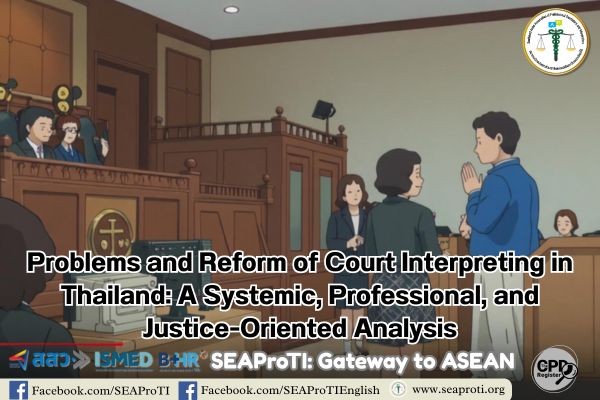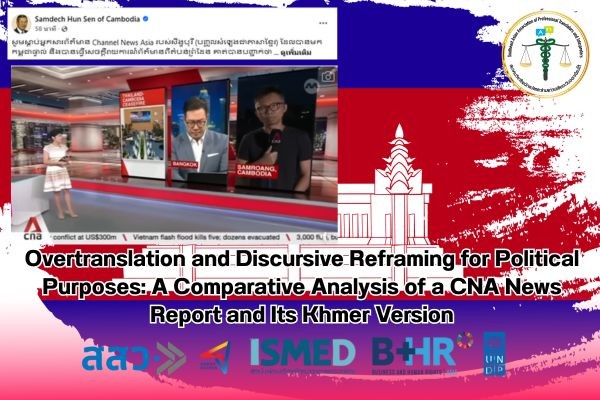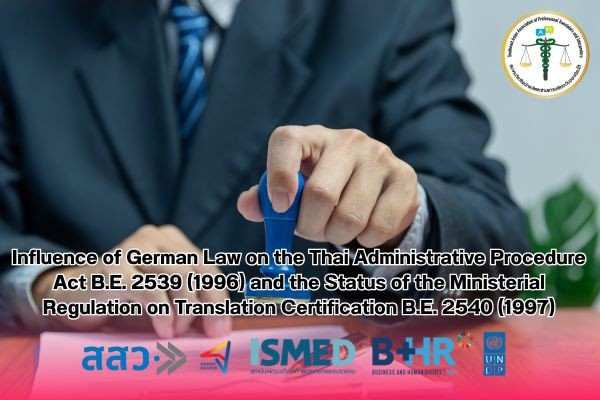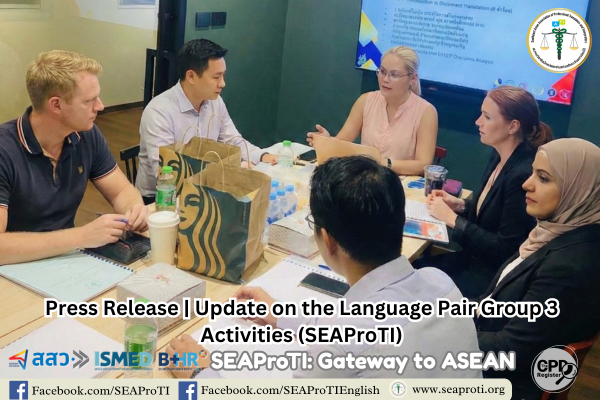Problems and Reform of Court Interpreting in Thailand:
A Systemic, Professional, and Justice-Oriented Analysis
13 October 2025, Bangkok – This article examines the structural, professional, and operational challenges faced by court interpreters in Thailand, which directly affect fairness in judicial proceedings. The analysis identifies four main issues: a lack of institutional coordination in interpreter recruitment, the absence of certification and quality assurance mechanisms, a limited understanding of interpreters’ professional roles and ethics, and low remuneration compared to the workload and responsibility. The article proposes the establishment of a central agency under the Ministry of Justice to manage interpreter registration, certification, and specialized training programs, as well as to ensure fair compensation and sustainable professional development. These reforms aim to elevate the professional status of Thai court interpreters and safeguard the fundamental right to a fair trial.
1. Introduction
Court interpreting plays a crucial role in protecting the rights of defendants and litigants who cannot communicate effectively in the court’s official language (Fairclough, 2018). In Thailand, however, the role of court interpreters is often perceived as a mere procedural requirement rather than a safeguard of human rights. This perception reflects an imbalance among law, professional standards, and actual practice, resulting in significant risks to justice and fairness.
2. Systemic and Legal Problems
Thailand’s judicial institutions—including the police, prosecutors, and courts—lack a unified system for selecting interpreters. Each applies different recruitment criteria (Office of the Judiciary, 2023). Although Section 13 of the Thai Criminal Procedure Code recognizes the right of defendants to an interpreter, no national standards define the interpreters’ qualifications or certification requirements. Consequently, untrained individuals or residents are often called upon to interpret, despite lacking sufficient linguistic or legal expertise.
3. Professional Quality and Standards
Thailand currently lacks a formal mechanism for assessing and certifying court interpreters, unlike countries such as the United Kingdom, Japan, and Australia, where interpreters are tested and officially registered (Berk-Seligson, 2017). The absence of such a system leads to the frequent use of interpreters without adequate knowledge of legal terminology or courtroom procedures. The problem is particularly severe in remote areas, such as border provinces in the North and South, where multiple community languages exist but few trained interpreters are available.
4. Ethics and Role Awareness
Empirical studies have shown that some court interpreters misunderstand or neglect their duties—for example, failing to interpret all parts of a hearing or omitting to interpret for the defendant during testimony (Tamura, 2021). In some courts, interpreters are appointed merely to fulfill a procedural requirement rather than to ensure genuine linguistic access. Ethical concerns, including impartiality, confidentiality, and integrity, remain major challenges, especially in cases involving foreign defendants.
5. Remuneration and Working Conditions
Court interpreters in Thailand receive significantly lower compensation than those in the private sector, despite working under high pressure where errors can have serious legal consequences. Many interpreters work without long-term contracts or benefits, leading to high turnover and a shortage of qualified interpreters across the judicial system (NRPSI, 2022).
6. Impact on Justice and Fairness
Interpretation errors can directly affect testimonies, evidence, and even verdicts, undermining both the rights of defendants and public confidence in the judicial system (Hale, 2014). The risk is especially acute for non-Thai speakers, who have no way to verify the accuracy of translations provided in court.
7. Reform Proposals and Policy Recommendations
To ensure fairness and improve quality, scholars and practitioners have proposed establishing a central agency under the Ministry of Justice to:
- Maintain a national database of registered court interpreters;
- Administer certification and qualification testing;
- Provide continuous professional development (CPD) programs; and
- Standardize and improve remuneration and welfare conditions.
Such measures would elevate court interpreters from being “procedural assistants” to “guardians of the right to understand and be understood” in legal proceedings.
8. Conclusion
Court interpreters are indispensable to the realization of justice in Thailand. The challenges they face are not merely individual shortcomings but systemic issues requiring comprehensive reform. By introducing standardized certification, ethical training, and centralized oversight, Thailand can align its court interpreting system with international human rights standards and ensure equitable access to justice for all.
References
- Berk-Seligson, S. (2017). The bilingual courtroom: Court interpreters in the judicial process (2nd ed.). University of Chicago Press.
- Fairclough, N. (2018). Language and power (3rd ed.). Routledge.
- Hale, S. (2014). The discourse of court interpreting: Discourse practices of the law, the witness and the interpreter. John Benjamins.
- National Register of Public Service Interpreters (NRPSI). (2022). Annual report on interpreting standards. London: NRPSI.
- Office of the Judiciary. (2023). Report on the development of court interpreting in the Thai justice system. Bangkok: Office of the Judiciary.
- Tamura, T. (2021). Interpreter roles and accountability in judicial settings. Tokyo: Waseda University Press.
About Certified Translators, Translation Certifiers, and Certified Interpreters of SEAProTI
The Southeast Asian Association of Professional Translators and Interpreters (SEAProTI) has formally announced the qualifications and requirements for registration of Certified Translators, Translation Certification Providers, and Certified Interpreters in Sections 9 and 10 of the Royal Gazette, published by the Secretariat of the Cabinet, Office of the Prime Minister of Thailand, on 25 July 2024 (Vol. 141, Part 66 Ng, p. 100). นักแปลรับรอง ผู้รับรองการแปล และล่ามรับรอง
The Council of State has proposed the enactment of a Royal Decree, granting registered translators and recognized translation certifiers from professional associations or accredited language institutions the authority to provide legally valid translation certification (จดหมายถึงสมาคม SEAProTI ลงวันที่ 28 เม.ย. 2568)
SEAProTI is the first professional association in Thailand and Southeast Asia to implement a comprehensive certification system for translators, certifiers, and interpreters.
Head Office: Baan Ratchakru Building, No. 33, Room 402, Soi Phahonyothin 5, Phahonyothin Road, Phaya Thai District, Bangkok 10400, Thailand
Email: hello@seaproti.com | Tel.: (+66) 2-114-3128 (Office hours: Mon–Fri, 09:00–17:00)
ปัญหาและแนวทางพัฒนาระบบล่ามศาลไทย:
วิเคราะห์เชิงระบบ มาตรฐานวิชาชีพ และความเป็นธรรมทางกระบวนการยุติธรรม
13 ตุลาคม 2568, กรุงเทพมหานคร – บทความนี้มุ่งศึกษาปัญหาเชิงโครงสร้าง มาตรฐานวิชาชีพ และการปฏิบัติงานจริงของล่ามศาลไทยซึ่งส่งผลโดยตรงต่อความเป็นธรรมทางกระบวนการยุติธรรม การวิเคราะห์พบว่าปัญหาหลักประกอบด้วยความไม่เป็นเอกภาพของระบบจัดหาล่าม การขาดมาตรฐานการรับรองคุณภาพ การไม่เข้าใจบทบาทของล่าม ตลอดจนปัญหาค่าตอบแทนและสวัสดิการที่ไม่เหมาะสม บทความเสนอแนวทางการปฏิรูปโดยการจัดตั้งหน่วยงานกลางภายใต้กระทรวงยุติธรรม เพื่อบริหารการขึ้นทะเบียน รับรองคุณภาพ และอบรมล่ามเฉพาะทางอย่างต่อเนื่อง เพื่อยกระดับความเป็นมืออาชีพของล่ามศาลและสร้างหลักประกันด้านสิทธิมนุษยชนในการพิจารณาคดี
1. บทนำ
การตีความหรือการล่ามในศาลเป็นกลไกสำคัญในการคุ้มครองสิทธิของผู้ต้องหาและคู่ความที่ไม่สามารถสื่อสารด้วยภาษาทางการของศาลได้อย่างมีประสิทธิภาพ (Fairclough, 2018) ในบริบทของประเทศไทย บทบาทของล่ามศาลยังคงถูกมองว่าเป็น “องค์ประกอบทางกฎหมาย” มากกว่าการเป็น “หลักประกันสิทธิ” ซึ่งสะท้อนถึงความไม่สมดุลระหว่างกฎหมาย มาตรฐานวิชาชีพ และการปฏิบัติจริง
2. ปัญหาด้านระบบและกฎหมาย
ระบบการจัดหาล่ามในกระบวนการยุติธรรมไทยยังขาดเอกภาพระหว่างหน่วยงาน เช่น ตำรวจ อัยการ และศาล ซึ่งใช้หลักเกณฑ์คัดเลือกล่ามแตกต่างกัน (สำนักงานศาลยุติธรรม, 2023) แม้ประมวลกฎหมายวิธีพิจารณาความอาญา มาตรา 13 จะระบุถึงสิทธิของจำเลยในการใช้ล่าม แต่ไม่มีมาตรฐานกลางด้านคุณสมบัติหรือการรับรอง ทำให้เกิดกรณีบุคคลทั่วไปถูกเรียกมาเป็นล่ามโดยไม่มีทักษะด้านภาษาและกฎหมายเพียงพอ
3. ปัญหาด้านคุณภาพและมาตรฐานวิชาชีพ
ประเทศไทยยังไม่มีระบบวัดความสามารถหรือการรับรองล่ามศาลอย่างเป็นทางการ ต่างจากประเทศที่มีกลไกทดสอบและขึ้นทะเบียน เช่น อังกฤษ ญี่ปุ่น และออสเตรเลีย (Berk-Seligson, 2017) ส่งผลให้เกิดการใช้ล่ามที่ขาดความรู้ทางกฎหมาย โดยเฉพาะในพื้นที่ห่างไกล เช่น จังหวัดชายแดนภาคเหนือและภาคใต้ ที่มีภาษาชุมชนหลากหลายแต่ขาดล่ามมืออาชีพ
4. ปัญหาด้านจรรยาบรรณและความเข้าใจในบทบาท
กรณีศึกษาหลายแห่งพบว่าล่ามบางรายไม่เข้าใจหน้าที่ของตนอย่างครบถ้วน เช่น ไม่ถ่ายทอดคำพูดทุกช่วงของการพิจารณา หรือไม่แปลให้จำเลยฟังอย่างต่อเนื่อง (Tamura, 2021) ศาลบางแห่งจัดหาล่ามเพียงเพื่อให้ “ครบองค์ประกอบทางกฎหมาย” โดยไม่ตระหนักถึงหลักความเป็นกลาง ความลับ และความซื่อสัตย์ทางวิชาชีพ ซึ่งเป็นหัวใจของงานล่ามในกระบวนการยุติธรรม
5. ปัญหาค่าตอบแทนและสภาพการทำงาน
ค่าตอบแทนของล่ามศาลต่ำกว่ามาตรฐานของล่ามภาคเอกชนอย่างมาก ทั้งที่ต้องทำงานภายใต้แรงกดดันสูงและความผิดพลาดไม่ได้ การขาดสัญญาจ้างระยะยาวและสวัสดิการพื้นฐานส่งผลให้ล่ามศาลจำนวนมากลาออก ทำให้ศาลขาดแคลนบุคลากรคุณภาพอย่างต่อเนื่อง (NRPSI, 2022)
6. ผลกระทบต่อความเป็นธรรมทางกระบวนการยุติธรรม
ความผิดพลาดจากการล่ามอาจส่งผลโดยตรงต่อคำให้การ พยานหลักฐาน และคำพิพากษาในคดี ซึ่งกระทบต่อสิทธิของจำเลยและความเชื่อมั่นของสังคมในระบบศาล (Hale, 2014) โดยเฉพาะในคดีที่เกี่ยวข้องกับชาวต่างชาติซึ่งไม่สามารถตรวจสอบความถูกต้องของคำแปลได้
7. แนวทางการพัฒนาและข้อเสนอเชิงนโยบาย
เพื่อลดปัญหาและสร้างระบบที่ยั่งยืน นักวิชาการและผู้เชี่ยวชาญเสนอให้มีการจัดตั้ง หน่วยงานกลางภายใต้กระทรวงยุติธรรม เพื่อ
- จัดทำฐานข้อมูลล่ามศาลขึ้นทะเบียนทั่วประเทศ
- จัดระบบสอบรับรองคุณสมบัติและทักษะภาษาเฉพาะทาง
- จัดอบรมต่อเนื่อง (CPD) เพื่อพัฒนามาตรฐานวิชาชีพ
- ปรับค่าตอบแทนและสวัสดิการให้สอดคล้องกับภาระงานและความรับผิดชอบ
การดำเนินการดังกล่าวจะช่วยยกระดับล่ามศาลจาก “ผู้ช่วยพิจารณาคดี” ไปสู่ “ผู้พิทักษ์สิทธิในการรับฟังและเข้าใจ” อย่างแท้จริง
8. สรุป
ล่ามศาลเป็นกลไกสำคัญที่สะท้อนความเป็นธรรมในกระบวนการยุติธรรมไทย ปัญหาที่เกิดขึ้นมิได้เป็นเพียงเรื่องของบุคลากร แต่เป็นปัญหาเชิงระบบที่ต้องได้รับการปฏิรูปอย่างจริงจัง ผ่านการสร้างมาตรฐานวิชาชีพ ระบบรับรองคุณภาพ และโครงสร้างการบริหารจัดการแบบรวมศูนย์ เพื่อให้การล่ามในศาลไทยก้าวสู่ระดับสากลและเป็นหลักประกันสิทธิมนุษยชนที่แท้จริง
บรรณานุกรม (References)
- Berk-Seligson, S. (2017). The Bilingual Courtroom: Court Interpreters in the Judicial Process (2nd ed.). University of Chicago Press.
- Fairclough, N. (2018). Language and Power (3rd ed.). Routledge.
- Hale, S. (2014). The Discourse of Court Interpreting: Discourse Practices of the Law, the Witness and the Interpreter. John Benjamins.
- National Register of Public Service Interpreters (NRPSI). (2022). Annual Report on Interpreting Standards. London: NRPSI.
- สำนักงานศาลยุติธรรม. (2566). รายงานการพัฒนางานล่ามในกระบวนการยุติธรรมไทย. กรุงเทพฯ: สำนักงานศาลยุติธรรม.
- Tamura, T. (2021). Interpreter Roles and Accountability in Judicial Settings. Tokyo: Waseda University Press.
- ปณิธาน อ่อนละออ. (2553). สภาพการทำงาน ทัศนคติ และบทบาทของล่ามในศาล [สารนิพนธ์ปริญญาอักษรศาสตรมหาบัณฑิต, จุฬาลงกรณ์มหาวิทยาลัย]. ศูนย์การแปลและการล่ามเฉลิมพระเกียรติ, คณะอักษรศาสตร์, จุฬาลงกรณ์มหาวิทยาลัย.
- ศิรินภา พัฒนภูทอง. (2560). มาตรการทางกฎหมายในการจัดหาล่ามให้จำเลยชาวต่างชาติในชั้นพิจารณาคดีอาญา [วิทยานิพนธ์ปริญญานิติศาสตรมหาบัณฑิต, มหาวิทยาลัยธุรกิจบัณฑิต].
- วิกฤติล่ามไทยในปี 2567 แวดวงล่ามไทยต้องเผชิญอะไรบ้าง (อ่านเพิ่มเติม)
- ความรับผิดชอบของล่ามในศาลและแนวทางดำเนินการเมื่อเกิดข้อผิดพลาดในการแปล (อ่านเพิ่มเติม)
เกี่ยวกับนักแปลรับรอง ผู้รับรองการแปล และล่ามรับรองของสมาคมวิชาชีพนักแปลและล่ามแห่งเอเชียตะวันออกเฉียงใต้
สมาคมวิชาชีพนักแปลและล่ามแห่งเอเชียตะวันออกเฉียงใต้ (SEAProTI) ได้ประกาศหลักเกณฑ์และคุณสมบัติผู้ที่ขึ้นทะเบียนเป็น “นักแปลรับรอง (Certified Translators) และผู้รับรองการแปล (Translation Certification Providers) และล่ามรับรอง (Certified Interpreters)” ของสมาคม หมวดที่ 9 และหมวดที่ 10 ในราชกิจจานุเบกษา ของสำนักเลขาธิการคณะรัฐมนตรี ในสำนักนายกรัฐมนตรี แห่งราชอาณาจักรไทย ลงวันที่ 25 ก.ค. 2567 เล่มที่ 141 ตอนที่ 66 ง หน้า 100 อ่านฉบับเต็มได้ที่: นักแปลรับรอง ผู้รับรองการแปล และล่ามรับรอง
สำนักคณะกรรมการกฤษฎีกาเสนอให้ตราเป็นพระราชกฤษฎีกา โดยกำหนดให้นักแปลที่ขึ้นทะเบียน รวมถึงผู้รับรองการแปลจากสมาคมวิชาชีพหรือสถาบันสอนภาษาที่มีการอบรมและขึ้นทะเบียน สามารถรับรองคำแปลได้ (จดหมายถึงสมาคม SEAProTI ลงวันที่ 28 เม.ย. 2568)
สมาคมวิชาชีพนักแปลและล่ามแห่งเอเชียตะวันออกเฉียงใต้ เป็นสมาคมวิชาชีพแห่งแรกในประเทศไทยและภูมิภาคเอเชียตะวันออกเฉียงใต้ที่มีระบบรับรองนักแปลรับรอง ผู้รับรองการแปล และล่ามรับรอง
สำนักงานใหญ่: อาคารบ้านราชครู เลขที่ 33 ห้อง 402 ซอยพหลโยธิน 5 ถนนพหลโยธิน แขวงพญาไท เขตพญาไท กรุงเทพมหานคร 10400 ประเทศไทย
อีเมล: hello@seaproti.com โทรศัพท์: (+66) 2-114-3128 (เวลาทำการ: วันจันทร์–วันศุกร์ เวลา 09.00–17.00 น.)

























